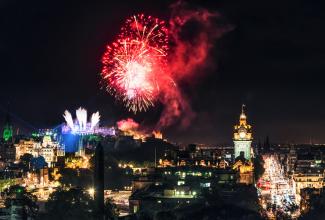
Do the preparation task first. Then read the article and do the exercises.
Preparation
'For last year's words belong to last year's language
And next year's words await another voice.
And to make an end is to make a beginning.' – TS Eliot
New year, old celebrations
There have been celebrations to mark the beginning of a new year for thousands of years. Sometimes these were simply an opportunity for people to eat, drink and have fun, but in some places the festivities were connected to the land or astronomical events. For example, in Egypt the beginning of the year coincided with when the River Nile flooded, and this normally happened when the star Sirius rose. The Persians and Phoenicians started their new year at the spring equinox (this is around 20 March when the Sun shines more or less directly on the equator and the length of the night and the day are almost the same).
The oldest celebration
The city of Babylon in ancient Mesopotamia was where the first New Year's celebrations were recorded about 4,000 years ago. The Babylonians held their celebrations on the first new moon after the spring equinox and called this festival Akitu (which comes from the word the Sumerians used for barley). Barley was cut in Mesopotamia in the spring, and during Akitu there was a different ritual on each of the 11 days that the celebration lasted. Statues of the gods were carried through the streets of the city, and in this way the Babylonians believed that their world had been cleaned to prepare for the new year and a new spring.
Modern celebrations
In many cities all over the world, spectacular fireworks displays take place as soon as the clock passes midnight on 31 December. In recent years, Sydney in Australia has been the host to one of the first of these celebrations as New Year arrives there before most other major international cities. The display takes place in Sydney Harbour, with the Opera House and Harbour Bridge making it a stunning setting. Fireworks light up the skies in hundreds of cities as 12 midnight strikes around the globe.
Traditions that live on
There are a number of strange and interesting New Year's traditions around the world. In Scotland, New Year's Eve is called Hogmanay and 'first footing' remains a popular custom with people visiting friends' and neighbours' houses just after midnight. The first person who visits your house should bring a gift as this will mean good luck. In Spain, it is the custom to eat 12 grapes as the bells sound for midnight on 31 December. One grape is eaten at each sound of the bell and each grape is supposed to bring good luck for each month of the year ahead. In Brazil, Ecuador, Bolivia, Venezuela and some other Central and South American countries, people wear special underwear of different colours on New Year's Eve. Red is supposed to be good for bringing love in the new year, while yellow is supposed to bring money.
Out with the old, in with the new
The new year is a perfect time to make a change for the better. The tradition of making New Year's resolutions is more common in the western hemisphere but also exists in the eastern hemisphere. This tradition involves a person making a commitment to change an unwanted habit or behaviour or setting a personal objective. Typical New Year's resolutions might be to give up smoking, eat healthier food, do more exercise, become more organised or laugh more – but really, a New Year's resolution can be almost anything. However, research suggests that many New Year's resolutions fail. Being realistic about the objectives you set and not making too many New Year's resolutions might help you to achieve success.




Hello agie,
The verb 'wish' is like the verb 'want' in that we very rarely see it in a continuous form. Here 'I wish...' is correct.
Peter
The LearnEnglish Team
Hi agie
The structure is 'wish somebody something', so people usually say 'I wish you and your family a joyful and prosperous 2019' or something similar.
All the best
Kirk
The LearnEnglish Team